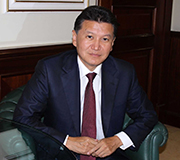 Two years ago, in March 2020, I wrote: “Politicians are mistaken in believing that the world can remain the same. The Covid pandemic has clearly shown that the old world no longer exists, its final destruction is only a matter of time.” I was led to such a sad conclusion by observing how quickly the habitual way of life, mixed with unrestrained consumption and false values, collapsed. And Covid is not as deadly as malaria that takes more lives in a couple of days than a newly appeared virus in a year.
Two years ago, in March 2020, I wrote: “Politicians are mistaken in believing that the world can remain the same. The Covid pandemic has clearly shown that the old world no longer exists, its final destruction is only a matter of time.” I was led to such a sad conclusion by observing how quickly the habitual way of life, mixed with unrestrained consumption and false values, collapsed. And Covid is not as deadly as malaria that takes more lives in a couple of days than a newly appeared virus in a year.
And while some of us froze in horror of the coming incomprehensible changes, the other try to keep the world within the framework of the usual rules and comfortable ideas.
I, like many others during the years of the pandemic, tried to understand: why exactly did we happen to live in an era of change? Moreover, these changes, apparently, affect the entire human civilization.
Not so long ago, I talked about a group of astrophysicists from the University of Rochester. Let me remind you that these scientists are conducting research of a Gaia theory put forward in the seventies of the last century. Without going into details, I will say that this theory proposes to consider the Earth as a physiological system, that is, a living being.
Try not to smile condescendingly. The existence of life on Earth, not to mention its origin, is still a serious mystery to science. A few scientists who have been studying the conditions for the existence and development of the biosphere for many years have come to the firm conclusion that not only we influence the Earth but the Earth itself contributes to the maintenance of life.
Rochester astrophysicists, based on their own research, go even further: they claim that our planet has its own consciousness. As wild as this thought may seem, it suggests the answer to at least one riddle.
Namely: why was life able not only to appear, but also to survive for many billions of years (in fact, almost throughout the entire geological history)?
After all, global cataclysms of an unimaginable scale are constantly occurring on Earth: eruptions of super volcanoes, asteroid falls, changes in the tilt of the axis, in which our planet turns into a giant snowball. And every time life is saved only by a miracle. It's a miracle. Still, we should remember that the Earth can do just fine without us as it did for millions and billions of years.
Konstantin Tsiolkovsky wrote a wonderful book, The Adventures of the Atom. This is the story of an atom, its migration from body to body, its life in these bodies, its impressions from being in plants, animals and people. The book is about his famous theory of monism that considers the structure of the Universe correlating with the structure of human society. Read, enjoy and make sure that everything around us - from an atom to the planet Earth - is alive. And how to live in such an environment - the choice is ours.
 Two years ago, in March 2020, I wrote: “Politicians are mistaken in believing that the world can remain the same. The Covid pandemic has clearly shown that the old world no longer exists, its final destruction is only a matter of time.” I was led to such a sad conclusion by observing how quickly the habitual way of life, mixed with unrestrained consumption and false values, collapsed. And Covid is not as deadly as malaria that takes more lives in a couple of days than a newly appeared virus in a year.
Two years ago, in March 2020, I wrote: “Politicians are mistaken in believing that the world can remain the same. The Covid pandemic has clearly shown that the old world no longer exists, its final destruction is only a matter of time.” I was led to such a sad conclusion by observing how quickly the habitual way of life, mixed with unrestrained consumption and false values, collapsed. And Covid is not as deadly as malaria that takes more lives in a couple of days than a newly appeared virus in a year.






















